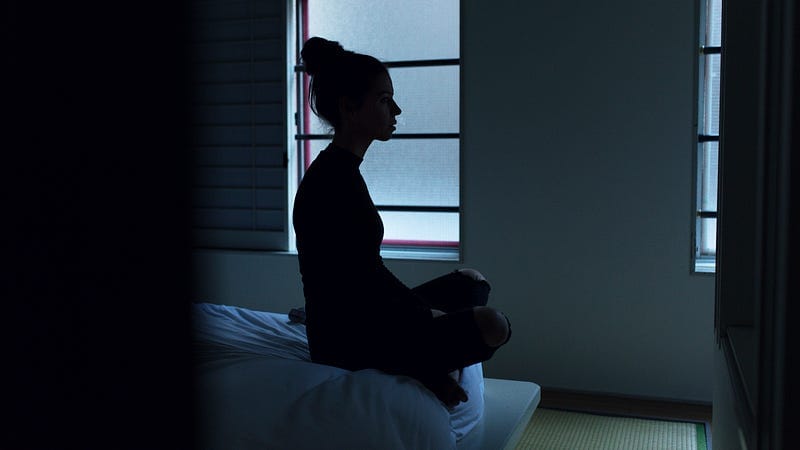When The Meds Don’t Work
Helpful tips for those seeking an alternative to medication for mental health.

When the Meds Don’t Work
Two pink pills drop into my palm, whispering everything will be fine once in my system. I hold them and fill a glass with milk. Night has fallen, along with my mood and I’m all too aware of my existence. I raise the full glass to my lips, staring at the pink tablets.
I know if I take them my mood will stay level. No more feeling like I’m flying as I drive down the highway. No more lows where I stay in bed — no motivation to clean or get up to eat. Maybe I’ll accomplish writing that book that’s been an idea for a decade, if I could just focus. I don’t really know what my brain will settle on, but I’ve grown used to it.
I study the pills before forcing them down my throat, one at a time. I lean against the wall, glass in hand, waiting for the whispers to stop. Now I’m alone and it feels like my imaginary friend has left with all my emotions as their hostage.
— — —
The above is an excerpt from a journal I kept a few years ago, detailing life while taking Lithium for Bipolar Disorder.
Writing in a journal is a habit that soaked up most of my free time back then (and to this day still does, honestly). I hoarded stacks throughout the years, with no room to fit them and no desire to get rid of each darling. Not even the incessant groans like ‘Another one? But you already have so many!’ from the people that know me could break my weekly routine.
But what did I learn from the hours spent scribbling?
— — —
#1 — Journaling Can Help Improve Your Life In Unexpected Ways
Don’t get me wrong. I’m not trying to say that writing in a journal is going to fix all your problems — but it is a great way to understand your thoughts and change them for the better. It’s a time to reflect on your choices — to understand how you ended up where you are now.

In my case, I wrote about things that caused me pain.
My journal wasn’t something I ever planned to share with the world. These notebooks were an extension of my mind when there was no more room for the incessant thoughts — they were private.
Writing helped get the words out of my head and I think that’s what I truly needed; a therapy all my own. I was forced to notice while rereading entries: my thoughts were tearing me apart.
Recording my struggles on paper made me realize the negativity was nudging me into depressive episodes. I learned that I had to literally change the way I was thinking if I expected life to improve.
#2 — Therapy Never Stuck, But It’s Worth A Shot
I’ve had an on/off relationship with therapy over the years. The idea of talking to a stranger about the feelings I had sounded like a terrible way to get help. Who wants to sit in a room and lie about all the awful tricks your mind plays on you?
Nobody that I know.
It was common to hear the whispers that therapy doesn’t actually help. I’ve heard horror stories from friends and it really turned me away from getting help because I let myself believe them and their experiences. I was under the assumption that every place was the same.
My first therapy session was at my high school’s Wellness Center.
I waited until I was eighteen. I remember the exact moment — sitting on the couch in the living room, with my laptop on a pillow. It was the middle of Winter break and I composed an email to my guidance counselor. At the time, I wasn’t sure who to contact, but she had been nice the few times I spoke with her when I was a new student.
When we all returned from break, I was pulled from class and sent to her office. My new adult status meant she couldn’t contact my dad and tell him what I wrote about in the email. I wouldn’t have to answer any questions about why I wanted to try therapy. It was a secret I wanted to keep from everyone.
She was able to refer me to the school therapist and though I only had a few appointments (I was nearing the end of Senior year) it kicked into gear my desire to get help. I realized just talking about the way I felt, eased the pain. It made seeking therapy not feel as intimidating as I grew older.
Through my job, I used MDLive to see a therapist and a psychiatrist. MDLive gave me access to therapy at my convenience and at an affordable rate ($5 per visit because of insurance through my job). I had bi-weekly sessions with a therapist in the comfort of my home, taking away the stress of waiting months just to see someone in person. Once a month I met with a psychiatrist who prescribed a few different combinations of medicines (none of which worked).
The third time I went to therapy was at a mental hospital.
Yep. You read that right. My final straw snapped when I was twenty-two and biked to the closest hospital. Three mornings a week for six months I attended group therapy until lunchtime. The routine disturbed my life in the best way possible, by forcefully carving time out to stop and focus on myself. I was on a downward spiral that needed to be stopped immediately and had I not fought through the anxiety of asking for help, I don’t know where I’d be today.

#3 — Fill Your Time With Things You Enjoy
This is the most important advice I could give you, if anything I say matters. One thing I’ve learned the hard way is that you are your own best friend — because throughout life people will come and go. What do you enjoy doing?
Personally, I’ve made it a point to fill my time with things that bring me happiness. I spend time writing and reading books. Connecting to nature is important to me, so I take time to walk on trails and visit new places. Anything that sounds interesting, I try out and I have yet to be disappointed. In these moments I learn more about myself and what kind of person I want to be. The closer I pay attention to that version, the more in-control I feel.
Conclusion
Living with mental illness can take a lot out of you and sometimes even medication isn’t the right solution. It’s important to recognize that there are multiple ways to manage it. In my own experience, medication for a short time helped get my brain jumpstarted on the right track. With hard work over the years and using these three techniques, I am able to achieve the same results without side effects that I endured while taking medication.
*Disclaimer*
This post is not meant to be a replacement for professional medical advice, diagnosis, or treatment. If you have any questions about a medical condition, always turn to your physician or health care practitioner. Never ignore professional medical advice or put off seeking it because of something you read here. I’m not a medical professional. I’m just sharing my experiences and knowledge and nothing here should be taken as a medical advice. Please check with your physician before following any advice you read here.




Comments ()